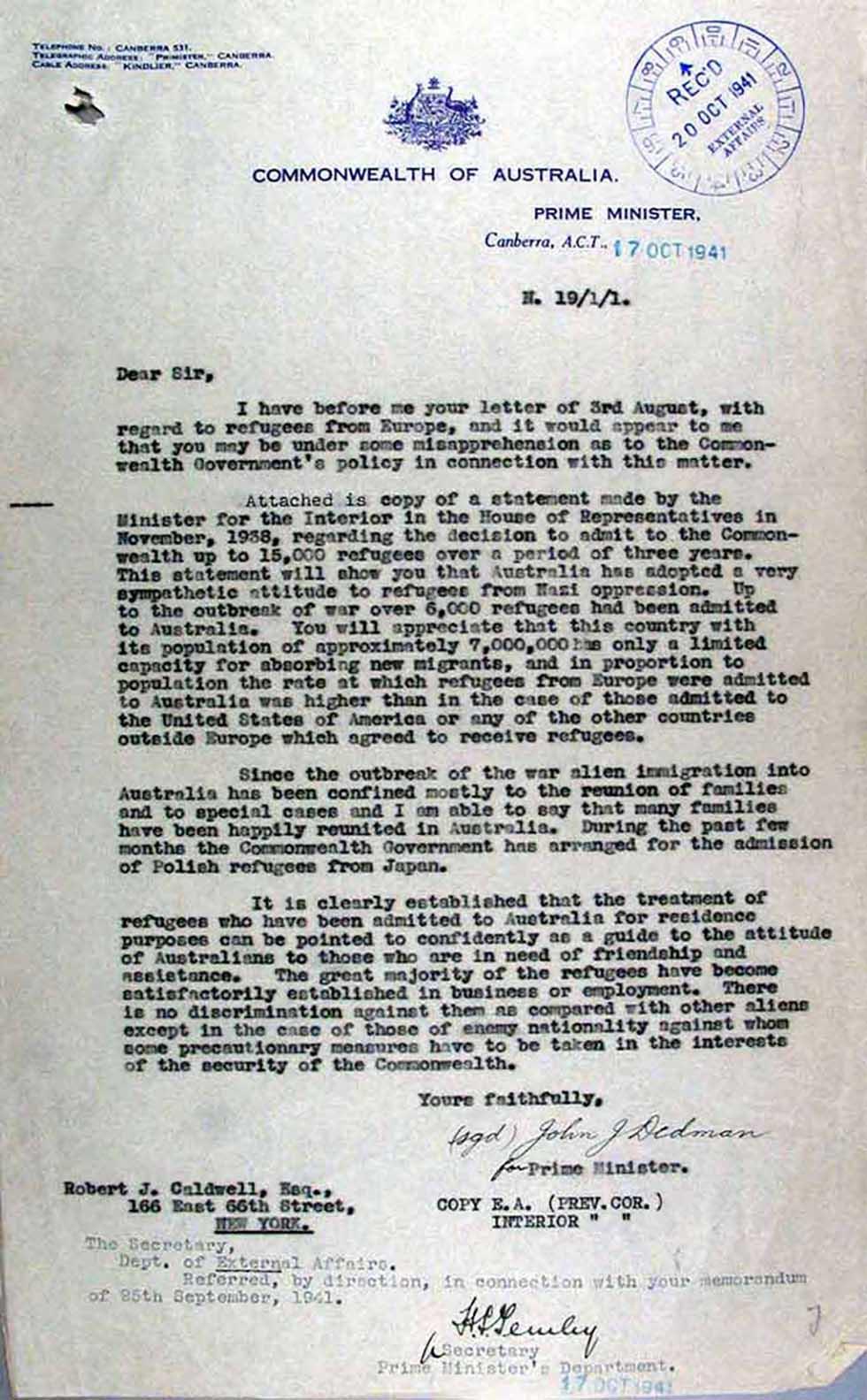
Reply to a letter from Robert J Caldwell
Aboriginal and Torres Strait Islander people should be aware that the National Archives' website and collection contain the names, images and voices of people who have died.
Some records include terms and views that are not appropriate today. They reflect the period in which they were created and are not the views of the National Archives.


Reply to a letter from Robert J Caldwell
[Letterhead in blue ink: ‘COMMONWEALTH OF AUSTRALIA’, ‘PRIME MINISTER’, ‘Canberra, A.C.T.,’]
[Stamped:] 17 OCT 1941
[Stamped in blue ink ‘REC’D’ [Received] ’20 OCT 1941’, ‘EXTERNAL AFFAIRS’.]
N. 19/1/1.
Dear Sir,
I have before me your letter of 3rd August, with regard to refugees from Europe, and it would appear to me that you may be under some misapprehension as to the Commonwealth Government’s policy in connection with this matter.
Attached is copy of a statement made by the Minister for the Interior in the House of Representatives in November, 1938, regarding the decision to admit to the Commonwealth up to 15,000 refugees over a period of three years. This statement will show you that Australia has adopted a very sympathetic attitude to refugees from Nazi oppression. Up to the outbreak of war 6,000 refugees had been admitted to Australia. You will appreciate that this country with its population of approximately 7,000,000 has only a limited capacity for absorbing new migrants, and in proportion to population the rate at which refugees from Europe were admitted to Australia were higher than in the case of those admitted to the United States of America or any of the other countries outside Europe which agreed to receive refugees.
Since the outbreak of the war alien immigration into Australia has been confined mostly to the reunion of families and to special cases and I am able to say that many families have been happily reunited in Australia. During the past few months the Commonwealth Government has arranged for the admission of Polish refugees from Japan.
It is clearly established that the treatment of refugees who have been admitted to Australia for residence purposes can be pointed to confidently as a guide to the attitude of Australians to those who are in need of friendship and assistance. The great majority of the refugees have become satisfactorily established in business or employment. There is no discrimination against them as compared with other aliens except in the case of those of enemy nationality against whom some precautionary measures have to be taken in the interests of the security of the Commonwealth.
Yours faithfully,
[Handwritten signature:] (sgd) John J Dedman
For Prime Minister.
[Addressed to:] Robert J Caldwell, Esq.,
166 East 66th Street
NEW YORK [underlined]
[Typed addition:] COPY E.A. [External Affairs] (PREV. COR.) [Previous correspondent]
INTERIOR [Quote marks under ‘PREV. COR.’)
[Typed addition:] The Secretary,
Dept. Of External [underlined] Affairs.
Referred, by direction, in connection with your memorandum of 25th September, 1941.
[Handwritten signature:] H.S. Semley
Secretary
Prime Minister’s Department
[Stamped:] 17 OCT 1941
Learn how to interpret primary sources, use our collection and more.
